Deck 11: Output and Costs
Question
Question
Question
Question
Question
Question
Question
Question
Question
Question
Question
Question
Question
Question
Question
Question
Question
Question
Question
Question
Question
Question
Question
Question
Question
Question
Question
Question
Question
Question
Question
Question
Question
Question
Question
Question
Question
Question
Question
Question
Question
Question
Question
Question
Question
Question
Question
Question
Question
Question
Question
Question
Question
Question
Question
Question
Question
Question
Question
Question
Question
Question
Question
Question
Question
Question
Question
Question
Question
Question
Question
Question
Question
Question
Question
Question
Question
Question
Question
Question

Unlock Deck
Sign up to unlock the cards in this deck!
Unlock Deck
Unlock Deck
1/133
Play
Full screen (f)
Deck 11: Output and Costs
1
Use the figure below to answer the following questions.
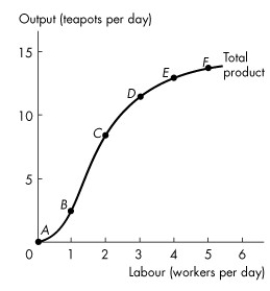
Figure 11.2.1
Refer to Figure 11.2.1 which illustrates Tania's total product curve.Average product of labour reaches its maximum for the ________ worker.
A)first
B)second
C)third
D)fourth
E)fifth

Figure 11.2.1
Refer to Figure 11.2.1 which illustrates Tania's total product curve.Average product of labour reaches its maximum for the ________ worker.
A)first
B)second
C)third
D)fourth
E)fifth
second
2
When the demand for electricity peaks during the hottest days of summer,Hydro One can generate more electricity by using more fuel and increasing the working hours of many of its employees.The company cannot,however,increase electric power production by building additional generating capacity.This means that the company is operating in the
A)market run.
B)intermediate run.
C)long run.
D)immediate run.
E)short run.
A)market run.
B)intermediate run.
C)long run.
D)immediate run.
E)short run.
short run.
3
Plant refers to those factors of production
A)that are too expensive for the firm to purchase.
B)that must be held in storage for at least one year.
C)that are fixed in the short run.
D)that have a decreasing marginal product as more of the factor is used.
E)which can be purchased only in fixed quantity lots.
A)that are too expensive for the firm to purchase.
B)that must be held in storage for at least one year.
C)that are fixed in the short run.
D)that have a decreasing marginal product as more of the factor is used.
E)which can be purchased only in fixed quantity lots.
that are fixed in the short run.
4
The short run refers to a time period
A)of one year or less.
B)in which all factors of production are variable.
C)in which all factors of production are fixed.
D)in which some factors of production are variable, but at least one factor of production is.
E)in which all factors of production are variable, but the technology is fixed.
A)of one year or less.
B)in which all factors of production are variable.
C)in which all factors of production are fixed.
D)in which some factors of production are variable, but at least one factor of production is.
E)in which all factors of production are variable, but the technology is fixed.

Unlock Deck
Unlock for access to all 133 flashcards in this deck.
Unlock Deck
k this deck
5
Use the figure below to answer the following questions.

Figure 11.2.1
Refer to Figure 11.2.1 which illustrates Tania's total product curve.Marginal product of labour reaches its maximum when the number of workers increases from
A)zero to 1.
B)1 to 2.
C)2 to 3.
D)3 to 4.
E)4 to 5.

Figure 11.2.1
Refer to Figure 11.2.1 which illustrates Tania's total product curve.Marginal product of labour reaches its maximum when the number of workers increases from
A)zero to 1.
B)1 to 2.
C)2 to 3.
D)3 to 4.
E)4 to 5.

Unlock Deck
Unlock for access to all 133 flashcards in this deck.
Unlock Deck
k this deck
6
Table 11.2.1
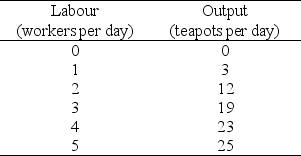
Refer to Table 11.2.1 which gives Tania's total product schedule.The marginal product when the number of workers increases from 1 to 2 is
A)3 teapots.
B)12 teapots.
C)7 teapots.
D)9 teapots.
E)6 teapots.

Refer to Table 11.2.1 which gives Tania's total product schedule.The marginal product when the number of workers increases from 1 to 2 is
A)3 teapots.
B)12 teapots.
C)7 teapots.
D)9 teapots.
E)6 teapots.

Unlock Deck
Unlock for access to all 133 flashcards in this deck.
Unlock Deck
k this deck
7
Use the information below to answer the following questions.
Fact 11.1.1
January 31, 2008: Starbucks will open 75 more stores abroad than originally predicted, for a total of 975.
February 25, 2008: For three hours on Tuesday, Starbucks will shut down every single one of its 7,100 stores so that baristas can receive a refresher course.
June 2, 2008: Starbucks replaces baristas with vending machines.
July 18, 2008: Starbucks is closing 616 stores by the end of March.
Refer to Fact 11.1.1.The decisions made on ________ are long-run decisions because they ________.
A)June 2;are changes to labour which affect people for the long term
B)January 31 and July 18;change Starbucks' plant
C)February 25, June 2, and July 18;all deal with stores located in the United States
D)January 31 and February 25;are the earliest decisions
E)None of the above.
Fact 11.1.1
January 31, 2008: Starbucks will open 75 more stores abroad than originally predicted, for a total of 975.
February 25, 2008: For three hours on Tuesday, Starbucks will shut down every single one of its 7,100 stores so that baristas can receive a refresher course.
June 2, 2008: Starbucks replaces baristas with vending machines.
July 18, 2008: Starbucks is closing 616 stores by the end of March.
Refer to Fact 11.1.1.The decisions made on ________ are long-run decisions because they ________.
A)June 2;are changes to labour which affect people for the long term
B)January 31 and July 18;change Starbucks' plant
C)February 25, June 2, and July 18;all deal with stores located in the United States
D)January 31 and February 25;are the earliest decisions
E)None of the above.

Unlock Deck
Unlock for access to all 133 flashcards in this deck.
Unlock Deck
k this deck
8
Choose the correct statement.
A)Expenditure on a plant that has no resale value is a sunk cost.
B)A sunk cost is irrelevant to a firm's current decisions.
C)A cost that influences a firm's current decisions is the short-run cost of changing its labour inputs.
D)A cost that influences a firm's current decisions is the long-run cost of changing its plant.
E)All of the above.
A)Expenditure on a plant that has no resale value is a sunk cost.
B)A sunk cost is irrelevant to a firm's current decisions.
C)A cost that influences a firm's current decisions is the short-run cost of changing its labour inputs.
D)A cost that influences a firm's current decisions is the long-run cost of changing its plant.
E)All of the above.

Unlock Deck
Unlock for access to all 133 flashcards in this deck.
Unlock Deck
k this deck
9
Use the figure below to answer the following questions.

Figure 11.2.1
Refer to Figure 11.2.1 which illustrates Tania's total product curve.Which one of the following statements is true?
A)The points above the curve are attainable and inefficient.
B)The points below the curve are attainable and inefficient.
C)The points below the curve are inefficient and unattainable.
D)The points on the curve are efficient and unattainable.
E)Marginal product is equal at every point on the total product curve.

Figure 11.2.1
Refer to Figure 11.2.1 which illustrates Tania's total product curve.Which one of the following statements is true?
A)The points above the curve are attainable and inefficient.
B)The points below the curve are attainable and inefficient.
C)The points below the curve are inefficient and unattainable.
D)The points on the curve are efficient and unattainable.
E)Marginal product is equal at every point on the total product curve.

Unlock Deck
Unlock for access to all 133 flashcards in this deck.
Unlock Deck
k this deck
10
The total product curve is a graph that shows the
A)minimum cost of producing a given amount of output using a given technology.
B)maximum profit from each unit of output sold.
C)maximum output that a given quantity of labour can produce.
D)maximum output that can be produced as technology advances.
E)change in total product for a given change in marginal product.
A)minimum cost of producing a given amount of output using a given technology.
B)maximum profit from each unit of output sold.
C)maximum output that a given quantity of labour can produce.
D)maximum output that can be produced as technology advances.
E)change in total product for a given change in marginal product.

Unlock Deck
Unlock for access to all 133 flashcards in this deck.
Unlock Deck
k this deck
11
Table 11.2.1

Refer to Table 11.2.1 which gives Tania's total product schedule.The average product when the firm hires two workers is
A)3 teapots per worker.
B)6 teapots per worker.
C)7 teapots per worker.
D)9 teapots per worker.
E)12 teapots per worker.

Refer to Table 11.2.1 which gives Tania's total product schedule.The average product when the firm hires two workers is
A)3 teapots per worker.
B)6 teapots per worker.
C)7 teapots per worker.
D)9 teapots per worker.
E)12 teapots per worker.

Unlock Deck
Unlock for access to all 133 flashcards in this deck.
Unlock Deck
k this deck
12
Use the information below to answer the following questions.
Fact 11.1.1
January 31, 2008: Starbucks will open 75 more stores abroad than originally predicted, for a total of 975.
February 25, 2008: For three hours on Tuesday, Starbucks will shut down every single one of its 7,100 stores so that baristas can receive a refresher course.
June 2, 2008: Starbucks replaces baristas with vending machines.
July 18, 2008: Starbucks is closing 616 stores by the end of March.
Refer to Fact 11.1.1.The decisions made on ________ are short-run decisions because they ________.
A)January 31 and July 18;change the number of stores but not necessarily the number of employees
B)February 25 and June 2;change a variable factor of production but not a fixed factor of production
C)February 25, June 2, and July 18;deal with stores located in the United States
D)June 2 and July 18;are the more recent decisions
E)None of the above.
Fact 11.1.1
January 31, 2008: Starbucks will open 75 more stores abroad than originally predicted, for a total of 975.
February 25, 2008: For three hours on Tuesday, Starbucks will shut down every single one of its 7,100 stores so that baristas can receive a refresher course.
June 2, 2008: Starbucks replaces baristas with vending machines.
July 18, 2008: Starbucks is closing 616 stores by the end of March.
Refer to Fact 11.1.1.The decisions made on ________ are short-run decisions because they ________.
A)January 31 and July 18;change the number of stores but not necessarily the number of employees
B)February 25 and June 2;change a variable factor of production but not a fixed factor of production
C)February 25, June 2, and July 18;deal with stores located in the United States
D)June 2 and July 18;are the more recent decisions
E)None of the above.

Unlock Deck
Unlock for access to all 133 flashcards in this deck.
Unlock Deck
k this deck
13
Choose the correct statement.
A)The long run is a period of time in which the quantity of at least one input is fixed.
B)The short run is a period of time in which the firm has sufficient time to change all its inputs.
C)The long run is a time frame that lasts for 10 years.
D)In the short run, the firm's plant is fixed.
E)A firm always has plenty of time to make decisions about changing its inputs no matter if it is in a short run or long run position.
A)The long run is a period of time in which the quantity of at least one input is fixed.
B)The short run is a period of time in which the firm has sufficient time to change all its inputs.
C)The long run is a time frame that lasts for 10 years.
D)In the short run, the firm's plant is fixed.
E)A firm always has plenty of time to make decisions about changing its inputs no matter if it is in a short run or long run position.

Unlock Deck
Unlock for access to all 133 flashcards in this deck.
Unlock Deck
k this deck
14
A firm's total product curve describes
A)the minimum cost of producing a given amount of output.
B)the maximum output that a given quantity of labour can produce.
C)how the maximum attainable output varies as the size of the firm's plant varies, given the quantity of labour employed.
D)how the management of the firm makes decisions over the short run.
E)how the amount of labour varies as the amount of output varies.
A)the minimum cost of producing a given amount of output.
B)the maximum output that a given quantity of labour can produce.
C)how the maximum attainable output varies as the size of the firm's plant varies, given the quantity of labour employed.
D)how the management of the firm makes decisions over the short run.
E)how the amount of labour varies as the amount of output varies.

Unlock Deck
Unlock for access to all 133 flashcards in this deck.
Unlock Deck
k this deck
15
Marginal product of labour is the increase in total product that results from a
A)one-unit increase in the quantity of labour employed, other inputs remaining the same.
B)one-unit increase in the quantity of fixed inputs employed, holding the quantity of the variable inputs constant.
C)one-unit increase in both the quantity of variable and fixed inputs.
D)change in the cost of labour.
E)1 percent change in the quantity of labour and the quantity of capital employed.
A)one-unit increase in the quantity of labour employed, other inputs remaining the same.
B)one-unit increase in the quantity of fixed inputs employed, holding the quantity of the variable inputs constant.
C)one-unit increase in both the quantity of variable and fixed inputs.
D)change in the cost of labour.
E)1 percent change in the quantity of labour and the quantity of capital employed.

Unlock Deck
Unlock for access to all 133 flashcards in this deck.
Unlock Deck
k this deck
16
The long run refers to a time period
A)of one year or less.
B)in which all factors of production are variable.
C)in which labour is variable, but plant is fixed.
D)when there is at least one variable factor of production.
E)of at least 5 years.
A)of one year or less.
B)in which all factors of production are variable.
C)in which labour is variable, but plant is fixed.
D)when there is at least one variable factor of production.
E)of at least 5 years.

Unlock Deck
Unlock for access to all 133 flashcards in this deck.
Unlock Deck
k this deck
17
Use the figure below to answer the following questions.

Figure 11.2.1
Refer to Figure 11.2.1 which illustrates Tania's total product curve.Which one of the following statements is false?
A)All the points above the curve are unattainable.
B)All the points below the curve are attainable.
C)All the points below the curve are inefficient.
D)The cost of producing at point B equals the cost of producing at point C.
E)All the points on the curve are attainable.

Figure 11.2.1
Refer to Figure 11.2.1 which illustrates Tania's total product curve.Which one of the following statements is false?
A)All the points above the curve are unattainable.
B)All the points below the curve are attainable.
C)All the points below the curve are inefficient.
D)The cost of producing at point B equals the cost of producing at point C.
E)All the points on the curve are attainable.

Unlock Deck
Unlock for access to all 133 flashcards in this deck.
Unlock Deck
k this deck
18
The short run is a time frame in which
A)the firm is not able to hire more workers.
B)the amount of output produced is fixed.
C)there is a shortage of most factors of production.
D)at least one factor of production is fixed.
E)there is not enough time to make all of the decisions necessary to maximize profit.
A)the firm is not able to hire more workers.
B)the amount of output produced is fixed.
C)there is a shortage of most factors of production.
D)at least one factor of production is fixed.
E)there is not enough time to make all of the decisions necessary to maximize profit.

Unlock Deck
Unlock for access to all 133 flashcards in this deck.
Unlock Deck
k this deck
19
Table 11.2.1

Refer to Table 11.2.1 which gives Tania's total product schedule.The marginal product when the firm increases the number of workers from 3 to 4 per day is
A)6 teapots.
B)2 teapots.
C)9 teapots.
D)7 teapots.
E)4 teapots.

Refer to Table 11.2.1 which gives Tania's total product schedule.The marginal product when the firm increases the number of workers from 3 to 4 per day is
A)6 teapots.
B)2 teapots.
C)9 teapots.
D)7 teapots.
E)4 teapots.

Unlock Deck
Unlock for access to all 133 flashcards in this deck.
Unlock Deck
k this deck
20
The long run is a time frame in which
A)the firm can hire all the workers it wants to employ, but it does not have sufficient time to buy more equipment.
B)the firm is able to maximize revenue.
C)the firm may want to build a bigger plant, but cannot do so.
D)economic efficiency is achieved.
E)the quantities of all factors of production can be varied.
A)the firm can hire all the workers it wants to employ, but it does not have sufficient time to buy more equipment.
B)the firm is able to maximize revenue.
C)the firm may want to build a bigger plant, but cannot do so.
D)economic efficiency is achieved.
E)the quantities of all factors of production can be varied.

Unlock Deck
Unlock for access to all 133 flashcards in this deck.
Unlock Deck
k this deck
21
Marginal product
A)is always negative.
B)is the slope of the total product curve.
C)is always zero.
D)lies between zero and one.
E)equals average product minus total product.
A)is always negative.
B)is the slope of the total product curve.
C)is always zero.
D)lies between zero and one.
E)equals average product minus total product.

Unlock Deck
Unlock for access to all 133 flashcards in this deck.
Unlock Deck
k this deck
22
The law of diminishing marginal returns states:
A)As the size of a plant increases, marginal product eventually decreases.
B)As the size of a firm's plant increases, average cost eventually decreases.
C)As a firm uses more of a variable factor of production, with a given quantity of the fixed factor of production, the marginal product of the variable factor eventually diminishes.
D)As a firm uses more of a variable factor of production, its average cost eventually decreases.
E)As a firm uses more of a variable factor or production, total product eventually decreases.
A)As the size of a plant increases, marginal product eventually decreases.
B)As the size of a firm's plant increases, average cost eventually decreases.
C)As a firm uses more of a variable factor of production, with a given quantity of the fixed factor of production, the marginal product of the variable factor eventually diminishes.
D)As a firm uses more of a variable factor of production, its average cost eventually decreases.
E)As a firm uses more of a variable factor or production, total product eventually decreases.

Unlock Deck
Unlock for access to all 133 flashcards in this deck.
Unlock Deck
k this deck
23
Table 11.2.1

Refer to Table 11.2.1 which gives Tania's total product schedule.Average product of labour reaches its maximum for the ________ worker.
A)first
B)second
C)third
D)fourth
E)fifth

Refer to Table 11.2.1 which gives Tania's total product schedule.Average product of labour reaches its maximum for the ________ worker.
A)first
B)second
C)third
D)fourth
E)fifth

Unlock Deck
Unlock for access to all 133 flashcards in this deck.
Unlock Deck
k this deck
24
The law of diminishing marginal returns refers to the tendency for ________ to eventually decrease as more labour is employed,everything else remaining the same.
A)average total cost
B)marginal cost
C)total product
D)marginal product of labour
E)average product of labour
A)average total cost
B)marginal cost
C)total product
D)marginal product of labour
E)average product of labour

Unlock Deck
Unlock for access to all 133 flashcards in this deck.
Unlock Deck
k this deck
25
When the marginal product of labour is less than the average product of labour,
A)the average product of labour is increasing.
B)the marginal product of labour is increasing.
C)the total product curve is negatively sloped.
D)the firm is experiencing diminishing marginal returns.
E)None of the above.
A)the average product of labour is increasing.
B)the marginal product of labour is increasing.
C)the total product curve is negatively sloped.
D)the firm is experiencing diminishing marginal returns.
E)None of the above.

Unlock Deck
Unlock for access to all 133 flashcards in this deck.
Unlock Deck
k this deck
26
Suppose a 1-unit increase in labour,from 2 to 3 workers,increases output from 10 to 15 tea cups.The marginal product from the increase in the quantity of labour is
A)1 tea cup.
B)3 tea cups.
C)4 tea cups.
D)5 tea cups.
E)15 tea cups.
A)1 tea cup.
B)3 tea cups.
C)4 tea cups.
D)5 tea cups.
E)15 tea cups.

Unlock Deck
Unlock for access to all 133 flashcards in this deck.
Unlock Deck
k this deck
27
Suppose a firm increases the quantity of labour employed from 5 to 6 workers,and as a result,the firm's total output increases from 100 units to 400 units.The marginal product of the sixth worker is
A)50 units.
B)100 units.
C)200 units.
D)300 units.
E)66.67 units.
A)50 units.
B)100 units.
C)200 units.
D)300 units.
E)66.67 units.

Unlock Deck
Unlock for access to all 133 flashcards in this deck.
Unlock Deck
k this deck
28
Table 11.2.1

Refer to Table 11.2.1 which gives Tania's total product schedule.Marginal product of labour reaches its maximum when the number of workers increases from
A)0 to 1.
B)1 to 2.
C)2 to 3.
D)3 to 4.
E)4 to 5

Refer to Table 11.2.1 which gives Tania's total product schedule.Marginal product of labour reaches its maximum when the number of workers increases from
A)0 to 1.
B)1 to 2.
C)2 to 3.
D)3 to 4.
E)4 to 5

Unlock Deck
Unlock for access to all 133 flashcards in this deck.
Unlock Deck
k this deck
29
Use the table below to answer the following questions.
Table 11.2.2
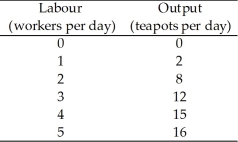
Refer to Table 11.2.2 which gives Tania's total product schedule.The marginal product when the number of workers increases from 2 to 3 is
A)1 teapot.
B)2 teapots.
C)3 teapots.
D)4 teapots.
E)3.75 teapots.
Table 11.2.2

Refer to Table 11.2.2 which gives Tania's total product schedule.The marginal product when the number of workers increases from 2 to 3 is
A)1 teapot.
B)2 teapots.
C)3 teapots.
D)4 teapots.
E)3.75 teapots.

Unlock Deck
Unlock for access to all 133 flashcards in this deck.
Unlock Deck
k this deck
30
Use the table below to answer the following questions.
Table 11.2.2

Refer to Table 11.2.2 which gives Tania's total product schedule.The average product when the firm hires three workers is
A)1 teapot per worker.
B)2 teapots per worker.
C)3 teapots per worker.
D)4 teapots per worker.
E)12 teapots per worker.
Table 11.2.2

Refer to Table 11.2.2 which gives Tania's total product schedule.The average product when the firm hires three workers is
A)1 teapot per worker.
B)2 teapots per worker.
C)3 teapots per worker.
D)4 teapots per worker.
E)12 teapots per worker.

Unlock Deck
Unlock for access to all 133 flashcards in this deck.
Unlock Deck
k this deck
31
When the marginal product of labour is greater than the average product of labour,
A)the average product of labour is increasing.
B)the marginal product of labour is increasing.
C)the total product curve is negatively sloped.
D)the firm is experiencing diminishing marginal returns.
E)the firm is experiencing constant returns.
A)the average product of labour is increasing.
B)the marginal product of labour is increasing.
C)the total product curve is negatively sloped.
D)the firm is experiencing diminishing marginal returns.
E)the firm is experiencing constant returns.

Unlock Deck
Unlock for access to all 133 flashcards in this deck.
Unlock Deck
k this deck
32
When the 7th worker is hired,output increases from 100 units per week to 110 units per week.When the 8th worker is hired,output increases from 110 units to 118 units.This is an example of
A)diminishing marginal returns.
B)diminishing marginal cost.
C)decreasing returns to scale.
D)labour-intensive production.
E)increasing returns to scale.
A)diminishing marginal returns.
B)diminishing marginal cost.
C)decreasing returns to scale.
D)labour-intensive production.
E)increasing returns to scale.

Unlock Deck
Unlock for access to all 133 flashcards in this deck.
Unlock Deck
k this deck
33
Which one of the following statements is true?
A)The highest value of average product occurs where average product is greater than marginal product.
B)When the average product curve is rising, marginal product is less than average product.
C)When the average product curve is falling, marginal product is greater than average product.
D)The maximum total product occurs at minimum marginal product.
E)The highest value of average product occurs where average product equals marginal product.
A)The highest value of average product occurs where average product is greater than marginal product.
B)When the average product curve is rising, marginal product is less than average product.
C)When the average product curve is falling, marginal product is greater than average product.
D)The maximum total product occurs at minimum marginal product.
E)The highest value of average product occurs where average product equals marginal product.

Unlock Deck
Unlock for access to all 133 flashcards in this deck.
Unlock Deck
k this deck
34
Use the figure below to answer the following question.
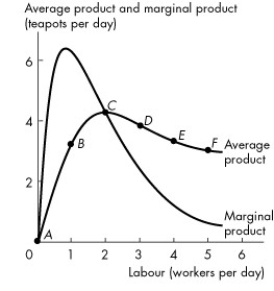
Figure 11.2.2
Refer to Figure 11.2.2 which shows Tania's average product curve and marginal product curve.The point of maximum average product is point
A)B.
B)C.
C)D.
D)E.
E)F.

Figure 11.2.2
Refer to Figure 11.2.2 which shows Tania's average product curve and marginal product curve.The point of maximum average product is point
A)B.
B)C.
C)D.
D)E.
E)F.

Unlock Deck
Unlock for access to all 133 flashcards in this deck.
Unlock Deck
k this deck
35
If the total product of three workers is 214 and the total product of four workers is 221,then the marginal product of the fourth worker is
A)71.3.
B)55.25.
C)7.
D)62.14.
E)1.75.
A)71.3.
B)55.25.
C)7.
D)62.14.
E)1.75.

Unlock Deck
Unlock for access to all 133 flashcards in this deck.
Unlock Deck
k this deck
36
Diminishing marginal returns refers to a situation where the ________ of an additional worker is less than the ________ of the previous worker.
A)marginal cost;marginal cost
B)average cost;average cost
C)marginal product;marginal product
D)average product;average product
E)marginal product;average product
A)marginal cost;marginal cost
B)average cost;average cost
C)marginal product;marginal product
D)average product;average product
E)marginal product;average product

Unlock Deck
Unlock for access to all 133 flashcards in this deck.
Unlock Deck
k this deck
37
The steeper the slope of the total product curve,
A)the smaller the average product.
B)the smaller the marginal product.
C)the greater the total cost.
D)the more efficient the technology employed.
E)the greater the marginal product.
A)the smaller the average product.
B)the smaller the marginal product.
C)the greater the total cost.
D)the more efficient the technology employed.
E)the greater the marginal product.

Unlock Deck
Unlock for access to all 133 flashcards in this deck.
Unlock Deck
k this deck
38
Use the table below to answer the following questions.
Table 11.2.2

Refer to Table 11.2.2 which gives Tania's total product schedule.The average product when the firm employs four workers is
A)2 teapots per worker.
B)8 teapots per worker.
C)12 teapots per worker.
D)15 teapots per worker.
E)3.75 teapots per worker.
Table 11.2.2

Refer to Table 11.2.2 which gives Tania's total product schedule.The average product when the firm employs four workers is
A)2 teapots per worker.
B)8 teapots per worker.
C)12 teapots per worker.
D)15 teapots per worker.
E)3.75 teapots per worker.

Unlock Deck
Unlock for access to all 133 flashcards in this deck.
Unlock Deck
k this deck
39
When Coffee 'n' Cream in Victoria,British Columbia hires two students,64 customers can be served in one hour.Suppose the manager of the restaurant observes that after hiring the third student,80 customers are being served in one hour.The marginal product of the third student is ________ customers per hour.
A)4
B)16
C)8
D)26.67
E)32
A)4
B)16
C)8
D)26.67
E)32

Unlock Deck
Unlock for access to all 133 flashcards in this deck.
Unlock Deck
k this deck
40
If the total product of four workers is 156,calculate the average product of each worker.
A)39
B)19.5
C)78
D)152
E)624
A)39
B)19.5
C)78
D)152
E)624

Unlock Deck
Unlock for access to all 133 flashcards in this deck.
Unlock Deck
k this deck
41
Refer to Table 11.2.3.The maximum value of marginal product occurs where output equals ________,while the maximum value of average product occurs where output equals ________.
A)5;6
B)6;5
C)7;14
D)9;14
E)14;11
A)5;6
B)6;5
C)7;14
D)9;14
E)14;11

Unlock Deck
Unlock for access to all 133 flashcards in this deck.
Unlock Deck
k this deck
42
If the marginal product of the fifth worker is 34,then the total product of five workers
A)is 35.
B)is 24.
C)is 170.
D)is 6.8.
E)cannot be calculated with the information given.
A)is 35.
B)is 24.
C)is 170.
D)is 6.8.
E)cannot be calculated with the information given.

Unlock Deck
Unlock for access to all 133 flashcards in this deck.
Unlock Deck
k this deck
43
Which of the following quotes best illustrates the idea of marginal product?
A)"If I have 10 workers on my assembly line, I can produce 13 tables a day."
B)"If I add an 11th worker, I can produce 1 extra table a day."
C)"Each worker produces 2 tables a day."
D)"I find if I add an extra shift at night, table production only rises by 80 percent because I need more maintenance time on the assembly line."
E)"If I double workers and double the assembly line, I can make 120 percent more tables."
A)"If I have 10 workers on my assembly line, I can produce 13 tables a day."
B)"If I add an 11th worker, I can produce 1 extra table a day."
C)"Each worker produces 2 tables a day."
D)"I find if I add an extra shift at night, table production only rises by 80 percent because I need more maintenance time on the assembly line."
E)"If I double workers and double the assembly line, I can make 120 percent more tables."

Unlock Deck
Unlock for access to all 133 flashcards in this deck.
Unlock Deck
k this deck
44
The marginal product of labour initially ________ and eventually ________.The average product of labour initially ________ and eventually ________.
A)increases;decreases;increases;decreases
B)decreases;increases;decreases;increases
C)increases;decreases;decreases;increases
D)decreases;increases;increases;decreases
E)increases;is constant;increases;decreases
A)increases;decreases;increases;decreases
B)decreases;increases;decreases;increases
C)increases;decreases;decreases;increases
D)decreases;increases;increases;decreases
E)increases;is constant;increases;decreases

Unlock Deck
Unlock for access to all 133 flashcards in this deck.
Unlock Deck
k this deck
45
Which one of the following statements is correct?
A)When marginal product is increasing, average product is decreasing.
B)When average product is less than zero, marginal product is positive.
C)When marginal product is increasing and greater than average product, average product is increasing.
D)When marginal product is zero, total product is at its minimum.
E)When average product exceeds marginal product, marginal product is increasing.
A)When marginal product is increasing, average product is decreasing.
B)When average product is less than zero, marginal product is positive.
C)When marginal product is increasing and greater than average product, average product is increasing.
D)When marginal product is zero, total product is at its minimum.
E)When average product exceeds marginal product, marginal product is increasing.

Unlock Deck
Unlock for access to all 133 flashcards in this deck.
Unlock Deck
k this deck
46
Use the table below to answer the following question.
Table 11.2.4
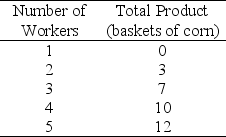
Refer to Table 11.2.4.The table gives the total product schedule of workers who harvest corn.Diminishing marginal returns begin when the ________ is hired.
A)1st labourer
B)2nd labourer
C)3rd labourer
D)4th labourer
E)There are no diminishing marginal returns since total product always rises.
Table 11.2.4

Refer to Table 11.2.4.The table gives the total product schedule of workers who harvest corn.Diminishing marginal returns begin when the ________ is hired.
A)1st labourer
B)2nd labourer
C)3rd labourer
D)4th labourer
E)There are no diminishing marginal returns since total product always rises.

Unlock Deck
Unlock for access to all 133 flashcards in this deck.
Unlock Deck
k this deck
47
The average product of energy equals
A)the increase in total product divided by the increase in energy used.
B)total product divided by the quantity of energy used.
C)the slope of the total product curve.
D)the slope of the marginal product curve.
E)the difference between the total product and the marginal product of energy.
A)the increase in total product divided by the increase in energy used.
B)total product divided by the quantity of energy used.
C)the slope of the total product curve.
D)the slope of the marginal product curve.
E)the difference between the total product and the marginal product of energy.

Unlock Deck
Unlock for access to all 133 flashcards in this deck.
Unlock Deck
k this deck
48
Which of the following quotes best illustrates the idea of average product?
A)"If I have 10 workers on my assembly line, I can produce 13 tables a day."
B)"If I add an 11th worker, I can produce 1 extra table a day."
C)"Each worker produces 2 tables a day."
D)"I find if I add an extra shift at night, table production only rises by 80 percent because I need more maintenance time on the assembly line."
E)"If I double workers and double the assembly line, I can make 120 percent more tables."
A)"If I have 10 workers on my assembly line, I can produce 13 tables a day."
B)"If I add an 11th worker, I can produce 1 extra table a day."
C)"Each worker produces 2 tables a day."
D)"I find if I add an extra shift at night, table production only rises by 80 percent because I need more maintenance time on the assembly line."
E)"If I double workers and double the assembly line, I can make 120 percent more tables."

Unlock Deck
Unlock for access to all 133 flashcards in this deck.
Unlock Deck
k this deck
49
Which of the following quotes best illustrates the idea of total product?
A)"If I have 10 workers on my assembly line, I can produce 13 tables a day."
B)"If I add an 11th worker, I can produce 1 extra table a day."
C)"Each worker produces 2 tables a day."
D)"I find if I add an extra shift at night, table production only rises by 80 percent because I need more maintenance time on the assembly line."
E)"If I double workers and double the assembly line, I can make 120 percent more tables."
A)"If I have 10 workers on my assembly line, I can produce 13 tables a day."
B)"If I add an 11th worker, I can produce 1 extra table a day."
C)"Each worker produces 2 tables a day."
D)"I find if I add an extra shift at night, table production only rises by 80 percent because I need more maintenance time on the assembly line."
E)"If I double workers and double the assembly line, I can make 120 percent more tables."

Unlock Deck
Unlock for access to all 133 flashcards in this deck.
Unlock Deck
k this deck
50
Choose the correct statement.
A)When marginal product of labour is greater than average product of labour and marginal product is either increasing or decreasing average product of labour is increasing.
B)When total product is increasing average product of labour and marginal product of labour are both increasing.
C)When marginal product of labour is greater than or equal to average product of labour, average product of labour is increasing.
D)When marginal product of labour is increasing, average product of labour is greater than marginal product of labour.
E)When total product is increasing, average product of labour is decreasing and marginal product of labour is increasing.
A)When marginal product of labour is greater than average product of labour and marginal product is either increasing or decreasing average product of labour is increasing.
B)When total product is increasing average product of labour and marginal product of labour are both increasing.
C)When marginal product of labour is greater than or equal to average product of labour, average product of labour is increasing.
D)When marginal product of labour is increasing, average product of labour is greater than marginal product of labour.
E)When total product is increasing, average product of labour is decreasing and marginal product of labour is increasing.

Unlock Deck
Unlock for access to all 133 flashcards in this deck.
Unlock Deck
k this deck
51
If capital is a variable input in a production process,the law of diminishing marginal returns implies that
A)total product is minimized.
B)capital's marginal product is positive and less than one.
C)total product is maximized.
D)marginal product of capital eventually decreases.
E)marginal product of capital is constant.
A)total product is minimized.
B)capital's marginal product is positive and less than one.
C)total product is maximized.
D)marginal product of capital eventually decreases.
E)marginal product of capital is constant.

Unlock Deck
Unlock for access to all 133 flashcards in this deck.
Unlock Deck
k this deck
52
If energy (E)is the only input used to produce output (Q),what is the formula for average product of energy?
A)
B)Q/E
C)
D)E/Q
E)Q*E
A)

B)Q/E
C)

D)E/Q
E)Q*E

Unlock Deck
Unlock for access to all 133 flashcards in this deck.
Unlock Deck
k this deck
53
Which of the following statements by a restaurant owner refers to the law of diminishing marginal returns?
A)"The higher the quality of the ingredients we use, the higher the cost of producing each meal."
B)"If we double the size of our premises and double everything else - kitchen staff, serving staff, equipment - we can increase the number of meals we serve, but not to double the current levels."
C)"We can increase the number of meals we serve by just adding more kitchen staff, but each additional worker adds less meals than the previous worker because traffic in the kitchen will get worse."
D)"We can serve the same number of meals with fewer kitchen staff, but we would have to buy more labour-saving kitchen equipment."
E)"We can serve the same number of meals with less kitchen equipment, but we would have to hire more kitchen staff."
A)"The higher the quality of the ingredients we use, the higher the cost of producing each meal."
B)"If we double the size of our premises and double everything else - kitchen staff, serving staff, equipment - we can increase the number of meals we serve, but not to double the current levels."
C)"We can increase the number of meals we serve by just adding more kitchen staff, but each additional worker adds less meals than the previous worker because traffic in the kitchen will get worse."
D)"We can serve the same number of meals with fewer kitchen staff, but we would have to buy more labour-saving kitchen equipment."
E)"We can serve the same number of meals with less kitchen equipment, but we would have to hire more kitchen staff."

Unlock Deck
Unlock for access to all 133 flashcards in this deck.
Unlock Deck
k this deck
54
Suppose the marginal product of energy equals the average product of energy.This implies that
A)marginal product is negative.
B)average product is at its maximum value.
C)marginal product is at its maximum value.
D)the marginal product curve is upward sloping.
E)average product is at its minimum value.
A)marginal product is negative.
B)average product is at its maximum value.
C)marginal product is at its maximum value.
D)the marginal product curve is upward sloping.
E)average product is at its minimum value.

Unlock Deck
Unlock for access to all 133 flashcards in this deck.
Unlock Deck
k this deck
55
The total output produced with any quantity of labour is equal to the sum of the
A)average products of each of the workers hired.
B)marginal costs of each of the workers hired.
C)marginal products of each of the workers hired.
D)average costs of each of the workers hired.
E)fixed products of each of the workers hired.
A)average products of each of the workers hired.
B)marginal costs of each of the workers hired.
C)marginal products of each of the workers hired.
D)average costs of each of the workers hired.
E)fixed products of each of the workers hired.

Unlock Deck
Unlock for access to all 133 flashcards in this deck.
Unlock Deck
k this deck
56
At that amount of output where diminishing marginal returns first sets in,
A)average product begins to decrease.
B)total product begins to decrease.
C)marginal cost begins to decrease.
D)marginal product begins to decrease.
E)All of the above.
A)average product begins to decrease.
B)total product begins to decrease.
C)marginal cost begins to decrease.
D)marginal product begins to decrease.
E)All of the above.

Unlock Deck
Unlock for access to all 133 flashcards in this deck.
Unlock Deck
k this deck
57
Use the table below to answer the following questions.
Table 11.2.3
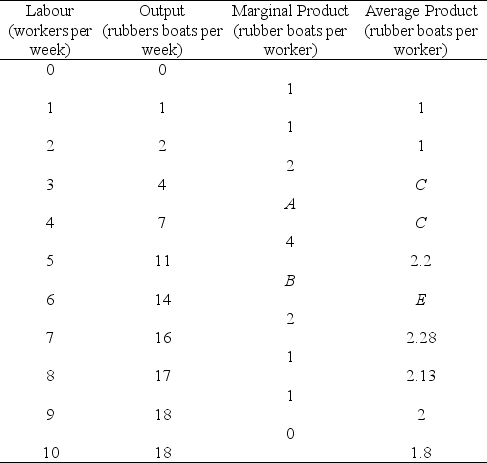
Refer to Table 11.2.3.The value of A is
A)1.75.
B)2.
C)3.
D)7.
E)4.
Table 11.2.3

Refer to Table 11.2.3.The value of A is
A)1.75.
B)2.
C)3.
D)7.
E)4.

Unlock Deck
Unlock for access to all 133 flashcards in this deck.
Unlock Deck
k this deck
58
The average product of labour is
A)the inverse of the average product of capital.
B)the slope of the marginal product of labour curve.
C)the slope of the total product curve.
D)greater than the average product of labour.
E)calculated as total product divided by the total quantity of labour employed.
A)the inverse of the average product of capital.
B)the slope of the marginal product of labour curve.
C)the slope of the total product curve.
D)greater than the average product of labour.
E)calculated as total product divided by the total quantity of labour employed.

Unlock Deck
Unlock for access to all 133 flashcards in this deck.
Unlock Deck
k this deck
59
The average product of labour equals
A)the slope of the total product curve.
B)the slope of the marginal product curve.
C)the increase in total product divided by the increase in labour employed.
D)total product divided by the quantity of labour employed.
E)the difference between the total product and the marginal product of labour.
A)the slope of the total product curve.
B)the slope of the marginal product curve.
C)the increase in total product divided by the increase in labour employed.
D)total product divided by the quantity of labour employed.
E)the difference between the total product and the marginal product of labour.

Unlock Deck
Unlock for access to all 133 flashcards in this deck.
Unlock Deck
k this deck
60
If energy (E)is the only input used to produce output (Q),what is the formula for marginal product of energy?
A)Q*E
B)Q/E
C)
D)
E)E/Q
A)Q*E
B)Q/E
C)

D)

E)E/Q

Unlock Deck
Unlock for access to all 133 flashcards in this deck.
Unlock Deck
k this deck
61
Use the table below to answer the following questions.
Table 11.3.1
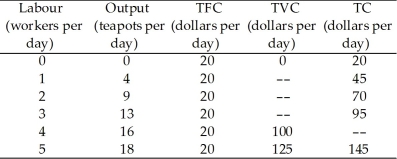
Refer to Table 11.3.1,which gives Tania's total cost schedule.The average total cost of producing 16 teapots per day is
A)$2.
B)$5.
C)$3.33.
D)$7.50.
E)$5.51.
Table 11.3.1

Refer to Table 11.3.1,which gives Tania's total cost schedule.The average total cost of producing 16 teapots per day is
A)$2.
B)$5.
C)$3.33.
D)$7.50.
E)$5.51.

Unlock Deck
Unlock for access to all 133 flashcards in this deck.
Unlock Deck
k this deck
62
Which one of the following statements is false?
A)Average total cost is total cost per unit of output.
B)Average fixed cost plus average variable cost equals average total cost.
C)Marginal cost is the increase in total cost resulting from a one-unit increase in output.
D)Total cost equals fixed cost plus average cost.
E)Marginal cost depends on the amount of labour hired.
A)Average total cost is total cost per unit of output.
B)Average fixed cost plus average variable cost equals average total cost.
C)Marginal cost is the increase in total cost resulting from a one-unit increase in output.
D)Total cost equals fixed cost plus average cost.
E)Marginal cost depends on the amount of labour hired.

Unlock Deck
Unlock for access to all 133 flashcards in this deck.
Unlock Deck
k this deck
63
Use the figure below to answer the following questions.
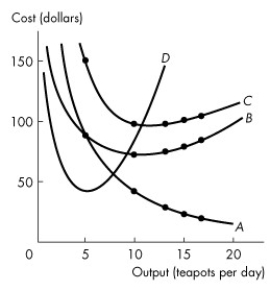
Figure 11.3.2
Refer to Figure 11.3.2,which illustrates short-run average and marginal cost curves.Which one of the following statements is false?
A)Average fixed cost decreases with output.
B)The vertical gap between curves B and C is equal to average variable cost.
C)Line B comes closer to line C as output increases because of a decrease in average fixed cost.
D)Curve D is the marginal cost curve.
E)The vertical gap between curves B and C is equal to average fixed cost.

Figure 11.3.2
Refer to Figure 11.3.2,which illustrates short-run average and marginal cost curves.Which one of the following statements is false?
A)Average fixed cost decreases with output.
B)The vertical gap between curves B and C is equal to average variable cost.
C)Line B comes closer to line C as output increases because of a decrease in average fixed cost.
D)Curve D is the marginal cost curve.
E)The vertical gap between curves B and C is equal to average fixed cost.

Unlock Deck
Unlock for access to all 133 flashcards in this deck.
Unlock Deck
k this deck
64
Which of the following are correct? According to the law of diminishing returns,
(1)marginal product eventually rises.
(2)marginal product eventually falls.
(3)marginal cost eventually rises.
(4)marginal cost eventually falls.
A)(1)and (3)
B)(1)and (4)
C)(2)and (3)
D)(2)and (4)
E)(4)
(1)marginal product eventually rises.
(2)marginal product eventually falls.
(3)marginal cost eventually rises.
(4)marginal cost eventually falls.
A)(1)and (3)
B)(1)and (4)
C)(2)and (3)
D)(2)and (4)
E)(4)

Unlock Deck
Unlock for access to all 133 flashcards in this deck.
Unlock Deck
k this deck
65
Average variable cost is at a minimum at the same output at which
A)average product is at a maximum.
B)average product is at a minimum.
C)marginal product is at a maximum.
D)marginal product is at a minimum.
E)marginal cost is at a minimum.
A)average product is at a maximum.
B)average product is at a minimum.
C)marginal product is at a maximum.
D)marginal product is at a minimum.
E)marginal cost is at a minimum.

Unlock Deck
Unlock for access to all 133 flashcards in this deck.
Unlock Deck
k this deck
66
Use the figure below to answer the following question.
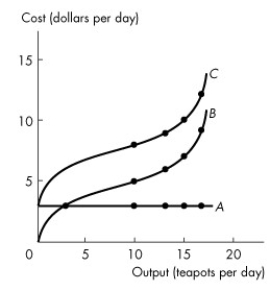
Figure 11.3.1
Refer to Figure 11.3.1.Which one of the following statements is false?
A)The total fixed cost curve A.
B)Total variable cost and total cost both increase with output.
C)The vertical gap between curves B and C is equal to total variable cost.
D)Marginal cost is equal to the slope of curve C.
E)Total fixed cost is constant.

Figure 11.3.1
Refer to Figure 11.3.1.Which one of the following statements is false?
A)The total fixed cost curve A.
B)Total variable cost and total cost both increase with output.
C)The vertical gap between curves B and C is equal to total variable cost.
D)Marginal cost is equal to the slope of curve C.
E)Total fixed cost is constant.

Unlock Deck
Unlock for access to all 133 flashcards in this deck.
Unlock Deck
k this deck
67
Which one of the following statements is false?
A)The average total cost curve and average variable cost curve are U-shaped.
B)The gap between the average total cost curve and the average variable cost curve equals marginal cost.
C)The gap between the average total cost curve and the average variable cost curve narrows as output increases.
D)The marginal cost curve intersects the average variable cost curve at minimum average variable cost.
E)The marginal cost curve intersects the average total cost curve at minimum average total cost.
A)The average total cost curve and average variable cost curve are U-shaped.
B)The gap between the average total cost curve and the average variable cost curve equals marginal cost.
C)The gap between the average total cost curve and the average variable cost curve narrows as output increases.
D)The marginal cost curve intersects the average variable cost curve at minimum average variable cost.
E)The marginal cost curve intersects the average total cost curve at minimum average total cost.

Unlock Deck
Unlock for access to all 133 flashcards in this deck.
Unlock Deck
k this deck
68
Which one of the following statements is false?
A)Total variable cost plus total fixed cost equals total cost.
B)Marginal cost equals the change in total cost divided by the change in output.
C)Average total cost is calculated by dividing total cost by the level of output.
D)The average cost curve is U-shaped.
E)The total cost curve is U-shaped.
A)Total variable cost plus total fixed cost equals total cost.
B)Marginal cost equals the change in total cost divided by the change in output.
C)Average total cost is calculated by dividing total cost by the level of output.
D)The average cost curve is U-shaped.
E)The total cost curve is U-shaped.

Unlock Deck
Unlock for access to all 133 flashcards in this deck.
Unlock Deck
k this deck
69
Use the table below to answer the following questions.
Table 11.3.1

Refer to Table 11.3.1,which gives Tania's total cost schedule.The average fixed cost of producing 9 teapots per day is
A)$2.22.
B)$1.25.
C)$10.00.
D)$1.11.
E)$1.54.
Table 11.3.1

Refer to Table 11.3.1,which gives Tania's total cost schedule.The average fixed cost of producing 9 teapots per day is
A)$2.22.
B)$1.25.
C)$10.00.
D)$1.11.
E)$1.54.

Unlock Deck
Unlock for access to all 133 flashcards in this deck.
Unlock Deck
k this deck
70
Use the table below to answer the following questions.
Table 11.3.2
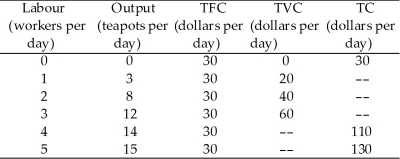
Refer to Table 11.3.2,which gives Tania's total cost schedule.When output increases from 8 to 12 teapots,the marginal cost of one of the 4 teapots is
A)$20.
B)$5.
C)$1.
D)$6.67.
E)$2.
Table 11.3.2

Refer to Table 11.3.2,which gives Tania's total cost schedule.When output increases from 8 to 12 teapots,the marginal cost of one of the 4 teapots is
A)$20.
B)$5.
C)$1.
D)$6.67.
E)$2.

Unlock Deck
Unlock for access to all 133 flashcards in this deck.
Unlock Deck
k this deck
71
Which one of the following is false?
A)The marginal cost curve intersects the average variable cost curve and the average total cost curve at their maximum points.
B)When marginal cost is greater than average variable cost, average variable cost is increasing.
C)When marginal cost is greater than average total cost, average total cost is increasing.
D)The average total cost curve is U-shaped.
E)The average fixed cost curve is downward sloping.
A)The marginal cost curve intersects the average variable cost curve and the average total cost curve at their maximum points.
B)When marginal cost is greater than average variable cost, average variable cost is increasing.
C)When marginal cost is greater than average total cost, average total cost is increasing.
D)The average total cost curve is U-shaped.
E)The average fixed cost curve is downward sloping.

Unlock Deck
Unlock for access to all 133 flashcards in this deck.
Unlock Deck
k this deck
72
The range over which average variable cost is decreasing is the same as the range over which
A)marginal cost is increasing.
B)average fixed cost is decreasing.
C)marginal product is decreasing.
D)average product is decreasing.
E)average product is increasing.
A)marginal cost is increasing.
B)average fixed cost is decreasing.
C)marginal product is decreasing.
D)average product is decreasing.
E)average product is increasing.

Unlock Deck
Unlock for access to all 133 flashcards in this deck.
Unlock Deck
k this deck
73
Marginal cost is equal to
A)total cost divided by output.
B)the increase in total cost divided by the increase in output.
C)the increase in total cost divided by the increase in labour input, given the amount of capital.
D)total variable cost minus total fixed cost.
E)the increase in total cost divided by the increase in variable cost.
A)total cost divided by output.
B)the increase in total cost divided by the increase in output.
C)the increase in total cost divided by the increase in labour input, given the amount of capital.
D)total variable cost minus total fixed cost.
E)the increase in total cost divided by the increase in variable cost.

Unlock Deck
Unlock for access to all 133 flashcards in this deck.
Unlock Deck
k this deck
74
Use the figure below to answer the following questions.

Figure 11.3.2
Refer to Figure 11.3.2,which illustrates the short-run average and marginal cost curves.The average variable cost curve is curve
A)A.
B)B.
C)C.
D)D.
E)none of the above.

Figure 11.3.2
Refer to Figure 11.3.2,which illustrates the short-run average and marginal cost curves.The average variable cost curve is curve
A)A.
B)B.
C)C.
D)D.
E)none of the above.

Unlock Deck
Unlock for access to all 133 flashcards in this deck.
Unlock Deck
k this deck
75
Use the figure below to answer the following questions.

Figure 11.3.2
Refer to Figure 11.3.2,which illustrates the short-run average and marginal cost curves.The marginal cost curve is curve
A)A.
B)B.
C)C.
D)D.
E)none of the above.

Figure 11.3.2
Refer to Figure 11.3.2,which illustrates the short-run average and marginal cost curves.The marginal cost curve is curve
A)A.
B)B.
C)C.
D)D.
E)none of the above.

Unlock Deck
Unlock for access to all 133 flashcards in this deck.
Unlock Deck
k this deck
76
As soon as diminishing returns set in,a firm's
A)marginal product increases.
B)average fixed cost decreases.
C)marginal cost decreases.
D)marginal cost increases.
E)total cost decreases.
A)marginal product increases.
B)average fixed cost decreases.
C)marginal cost decreases.
D)marginal cost increases.
E)total cost decreases.

Unlock Deck
Unlock for access to all 133 flashcards in this deck.
Unlock Deck
k this deck
77
If an increase in output from 5 to 10 teapots increases total cost from $100 to $200,the marginal cost of one of those 5 teapots is
A)$10.
B)$20.
C)$22.
D)$25.
E)dependent upon the amount of extra labour used.
A)$10.
B)$20.
C)$22.
D)$25.
E)dependent upon the amount of extra labour used.

Unlock Deck
Unlock for access to all 133 flashcards in this deck.
Unlock Deck
k this deck
78
Use the table below to answer the following questions.
Table 11.3.1

Refer to Table 11.3.1,which gives Tania's total cost schedule.When output increases from 4 to 9 teapots,the marginal cost of one of the 5 teapots is
A)$4.25.
B)$4.
C)$25.
D)$6.25.
E)$5.
Table 11.3.1

Refer to Table 11.3.1,which gives Tania's total cost schedule.When output increases from 4 to 9 teapots,the marginal cost of one of the 5 teapots is
A)$4.25.
B)$4.
C)$25.
D)$6.25.
E)$5.

Unlock Deck
Unlock for access to all 133 flashcards in this deck.
Unlock Deck
k this deck
79
Choose the correct equation.
A)TFC=TC/Q
B)TFC=TC-AVC
C)TFC=TC-TVC
D)TFC=TVC/Q
E)TFC=TVC-TC
A)TFC=TC/Q
B)TFC=TC-AVC
C)TFC=TC-TVC
D)TFC=TVC/Q
E)TFC=TVC-TC

Unlock Deck
Unlock for access to all 133 flashcards in this deck.
Unlock Deck
k this deck
80
Use the table below to answer the following questions.
Table 11.3.2

Refer to Table 11.3.2,which gives Tania's total cost schedule.The average total cost of producing 14 teapots is
A)$7.86.
B)$6.75.
C)$7.
D)$1.75.
E)$27.50.
Table 11.3.2

Refer to Table 11.3.2,which gives Tania's total cost schedule.The average total cost of producing 14 teapots is
A)$7.86.
B)$6.75.
C)$7.
D)$1.75.
E)$27.50.

Unlock Deck
Unlock for access to all 133 flashcards in this deck.
Unlock Deck
k this deck



